第四讲非谓语动词
- 格式:docx
- 大小:80.38 KB
- 文档页数:10
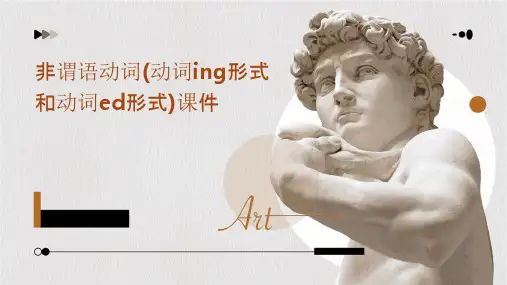
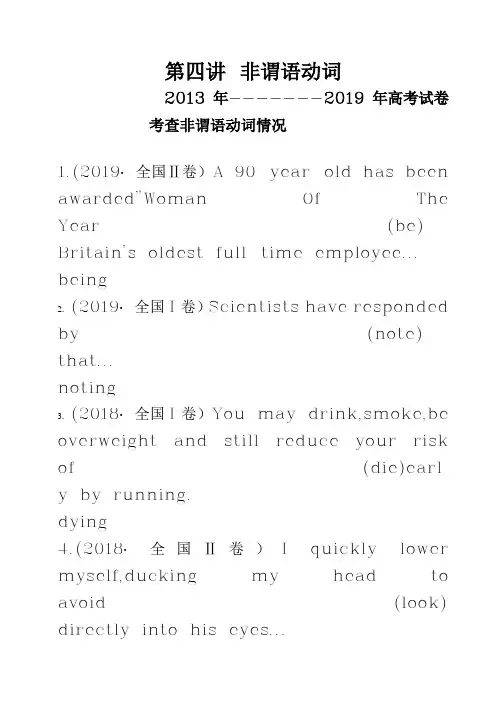
第四讲非谓语动词2013年-------2019年高考试卷考查非谓语动词情况1.(2019·全国Ⅱ卷)A 90-year-old has been awarded"Woman Of The Year______________________(be) Britain's oldest full-time employee... being2.(2019·全国I卷)Scientists have responded by______________________(note) that...noting3.(2018·全国I卷)You may drink,smoke,be overweight and still reduce your risk of______________________(die)early by running.dying4.(2018·全国Ⅱ卷)I quickly lower myself,ducking my head to avoid______________________(look) directly into his eyes...looking5.(2019·全国Ⅱ卷)When we got a call______________________(say)sh e was short-listed,we thought...saying6.(2019·全国Ⅱ卷)On the last day of our week-long stay,we were invited to attend a private concert on a beautiful farm on the North Shore under the stars,________(listen) to musicians and meeting interesting locals.listening7.(2018·全国Ⅱ卷)China's approach to protecting its environment while______________________(feed )its citizens " offers useful lessons for agriculture and food policymakers worldwide , " says th bank's Juergen Voegele.feeding8.(2019·全国I卷)Modern methods...are expensive______________________(perform)consistently overa large area.to perform9.(2019·全国Ⅱ卷)...how long it would take______________________(get)t here.to get10.(2018·全国I卷)You don't have to run fast or for long______________________(see)the benefit.to see11.(2018·全国Ⅱ卷)Another reason for corn's rise:The government encourages farmers to grow corn instead of rice ______________________(improve) water quality.to improve12.(2019·全国Ⅱ卷)...she had no plans______________________(retir e)from her 36-year-old business.to retire13.(2018·全国Ⅱ卷)Once his message wasdelivered,he allowed me______________________(stay)a nd watch.to stay考点二、非谓语动词作状语1.(2017北京,27)Many airlines now allow passengers to print their boarding passes online ____________(save) their valuable time.【答案】to save【解析】句意:现在很多航空公司允许乘客在网上打印登机证来节省他们宝贵的时间。
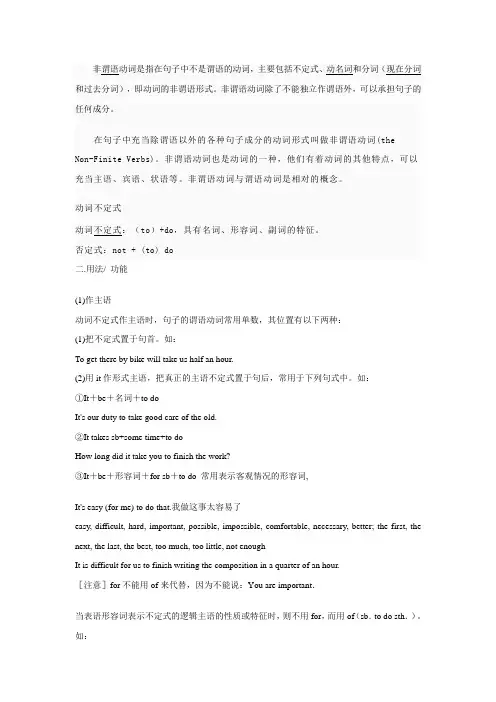
非谓语动词是指在句子中不是谓语的动词,主要包括不定式、动名词和分词(现在分词和过去分词),即动词的非谓语形式。
非谓语动词除了不能独立作谓语外,可以承担句子的任何成分。
在句子中充当除谓语以外的各种句子成分的动词形式叫做非谓语动词(theNon-Finite Verbs)。
非谓语动词也是动词的一种,他们有着动词的其他特点,可以充当主语、宾语、状语等。
非谓语动词与谓语动词是相对的概念。
动词不定式动词不定式:(to)+do,具有名词、形容词、副词的特征。
否定式:not + (to) do二.用法/ 功能(1)作主语动词不定式作主语时,句子的谓语动词常用单数,其位置有以下两种:(1)把不定式置于句首。
如:To get there by bike will take us half an hour.(2)用it作形式主语,把真正的主语不定式置于句后,常用于下列句式中。
如:①It+be+名词+to doIt's our duty to take good care of the old.②It takes sb+some time+to doHow long did it take you to finish the work?③It+be+形容词+for sb+to do 常用表示客观情况的形容词,It's easy (for me) to do that.我做这事太容易了easy, difficult, hard, important, possible, impossible, comfortable, necessary, better; the first, the next, the last, the best, too much, too little, not enoughIt is difficult for us to finish writing the composition in a quarter of an hour.[注意]for不能用of来代替,因为不能说:You are important.当表语形容词表示不定式的逻辑主语的性质或特征时,则不用for,而用of(sb.to do sth.)。

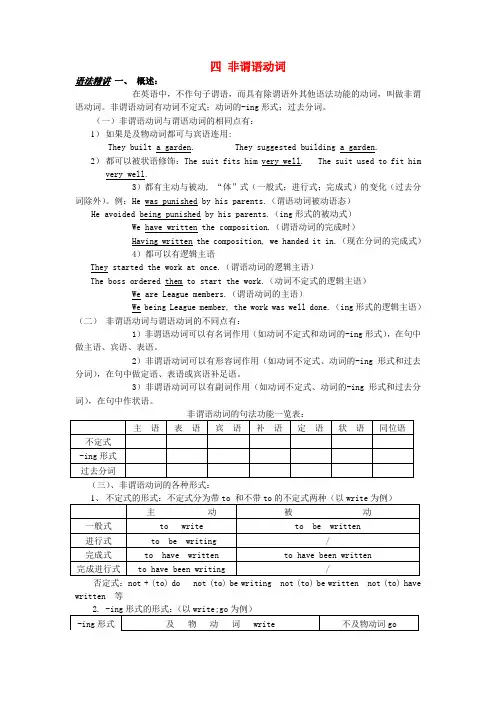
四非谓语动词语法精讲一、概述:在英语中,不作句子谓语,而具有除谓语外其他语法功能的动词,叫做非谓语动词。
非谓语动词有动词不定式;动词的-ing形式;过去分词。
(一)非谓语动词与谓语动词的相同点有:1)如果是及物动词都可与宾语连用:They built a garden. They suggested building a garden.2)都可以被状语修饰:The suit fits him very well. The suit used to fit him very well.3)都有主动与被动, “体”式(一般式;进行式;完成式)的变化(过去分词除外)。
例:He was punished by his parents.(谓语动词被动语态)He avoided being punished by his parents.(ing形式的被动式)We have written the composition.(谓语动词的完成时)Having written the composition, we handed it in.(现在分词的完成式)4)都可以有逻辑主语They started the work at once.(谓语动词的逻辑主语)The boss ordered them to start the work.(动词不定式的逻辑主语)We are League members.(谓语动词的主语)We being League member, the work was well done.(ing形式的逻辑主语)(二)非谓语动词与谓语动词的不同点有:1)非谓语动词可以有名词作用(如动词不定式和动词的-ing形式),在句中做主语、宾语、表语。
2)非谓语动词可以有形容词作用(如动词不定式、动词的-ing形式和过去分词),在句中做定语、表语或宾语补足语。
3)非谓语动词可以有副词作用(如动词不定式、动词的-ing形式和过去分词),在句中作状语。


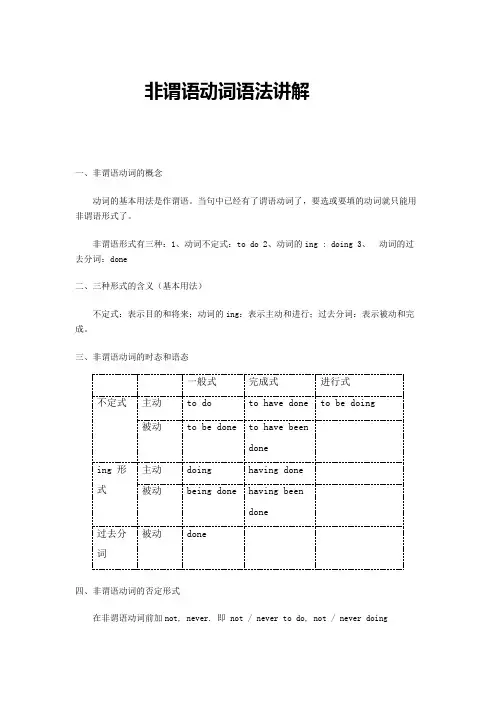
非谓语动词语法讲解一、非谓语动词的概念动词的基本用法是作谓语。
当句中已经有了谓语动词了,要选或要填的动词就只能用非谓语形式了。
非谓语形式有三种:1、动词不定式:to do 2、动词的ing : doing 3、动词的过去分词:done二、三种形式的含义(基本用法)不定式:表示目的和将来;动词的ing:表示主动和进行;过去分词:表示被动和完成。
三、非谓语动词的时态和语态一般式完成式进行式不定式主动to do to have done to be doing被动to be done to have beendoneing 形式主动doing having done 被动being done having beendone过去分词被动done四、非谓语动词的否定形式在非谓语动词前加not, never. 即 not / never to do, not / never doing五、非谓语动词的复合结构不定式的复合结构:for / of sb. to do sth.动词 ing 形式的复合结构:宾格或所有格+doing (-ing 形式作主语时,用的所有格+doing)六、非谓语动词的做题步骤1、判定是否用非谓语形式。
方法:看看句子中是否已有了谓语动词了2、找非谓语动词的逻辑主语。
方法:非谓语动词的逻辑主语一般是句子的主语。
3、判断主被动关系。
方法:非谓语动词与其逻辑主语的主动还是被动关系。
4、判断时间关系。
方法:分析句子,看看非谓语动词所表示的动作发生在谓语动作之前、之后还是同时。
之前常用 done; 之后常用to do; 同时常用doing.学习非谓语形式时,建议把三种形式一起来比较学习,会更加有效一些。
七、非谓语动词作主语和表语的比较1、不定式和动名词作主语和表语a. 不定式表示一次性的、具体的动词。
动词ing 常表示一般的、泛指的或习惯性的动作。
如:________ is a good form of exercise for both young and old.A. The walkB. WalkingC. To walkD. Walk(分析) a good form 暗示泛指一般的行为,用动名词作主语,选 Bb. 不定式作主语时,常用it 作形式主语,即用句型:It is + adj. / n. + (for / of sb. ) to do sth.It’s important for us to learn English well.It’s kind of you to help us.注意:下面几个句型是用动名词:It’s no good / use doing sth.It’s usel ess doing sth.There is no need to do sth.2、不定式、动名词、分词作表语的比较1、不定式、动名词作表语,.表示主语的内容。

练习四非谓语动词练习题作者: 日期:第四讲非谓语动词1. _____ is not very easy.A. Work out the problemB. To ask him to comeC. Send it to AmericaD. To be become a teacher2. It will take a long time ______ a round the coun try.A. to travelli ngB. to travelC. travelD. travelli ng3. Mathilde had years of hard work, little food, only a cold room ______ and n ever had a mome nt torest.A. to liveB. livi ngC. liveD. to live in4. He hates ______ the pho ne, and very often just lets it _______ .A. to an swer; ringingB. answering; ringC. to an swer; to ringD. answe ring; ringing5. I asked him to stop ______ n o ise, for I could not make out what the speaker was say ing.A. to makeB. makeC. maki ngD. to maki ng6. It was so no isy that I could n't make myself _____ clearly.A. being heardB. heari ngC. heardD. liste n7. At the back of the house, there is a path ______ the river.A. leads toB. led toC. leadi ng toD. has led to8. The n eed _____ foreig n Ian guages is beco ming greater and greater.A. to learnB. learni ngC. to be lear nedD. being lear ned9. The story is long. But it is worth _____ .A. liste nB. liste ning toC. listen to itD. to liste n10. It's no use ______ h ere worry ing about it. Let's go to the teacher to give a clear expla nati on.A. sitti ngB. sitC. to sitD. sat11. It's very clever ______ him to say so.A. forB. toC. withD. of12. The master ordered ______ .A. the room to be sweptB. to sweep the roomC. sweep ing the roomD. the room swept13. They fou nd their bikes _____ .A. stole nB. to stealC. steali ngD. stole14. What he said was really too good for us to ________ .A. be believedB. believi ng itC. believeD. believe it15. As you've n ever bee n there before, I'll have some one _____ y ou the way.A. to showB. showC. show ingD. showed16. On her way home, she found her han dbag _____ .A. being lostB. missedC. losi ngD. missi ng17. Mr Smith as well as his childre n and wife ______ p hotos on the Great Wall.A. was see n takeB. were see n takeC. was see n tak ingD. were see n tak ing18. The tools in the workshop are not allowed ______ .A. tak ing outB. to take outC. to be take n outD. being take n out19. The books ______ duri ng the term must be returned to the library before you leave the school forthe vacati on.A. borrow ingB. to brorrowC. to be borrowedD. borrowed20. "You've come just in time to help us.""Fi ne. What needs ______ ?"A. I doB. doneC. to be doneD. to do21. _____ as the best doctor in tow n, Mr. Kn echt always has a lot of patie nts.A. To regardB. RegardedC. RegardD. Regard ing22. He had a bad habit of sleep ing with all the win dows _____ .A. closeB. closedC. closi ngD. to close23. This sentence needs ______ .A. a improveme ntB. improveC. improv ingD. improved24. I feel it's an honour ______ to attend the opening ceremony of the new company.A. to in viteB. of being in vitedC. to be in vitedD. havi ng in vited25. _____ early in win ter?A. Do you use to get upB. Use you to get upC. Are you used to get upD. Are you used to gett ing up26. This boy enjoys ______ questi ons but dislikes _______ them.A. ask ing; an sweri ngB. to ask; an sweri ngC. ask ing; to an swerD. to ask; to an swer27. Elie n was abse nt this morning because she had her tooth _____ .A. filli ngB. hav ing bee n filledC. filledD. filled28. She was _______ and did not know what was waiting before her.A. puzzli ngB. puzzledC. being puzzledD. puzzle29. I've n ever see n so much nice food. I don't know _____ .A. which could takeB. which one to takeC. what to takeD. to take which30. _____ dark glasses in the sun may protect your eyes.A. Weari ngB. WearC. Put onD. Putti ng on31. Most of the artists ______ t o the party were from South Africa.A. i nvitedB. to in viteC. being in vitedD. had bee n in vited32. We must do everyth ing possible to preve nt such things from _____ aga in.A. happe ningB. to happe nC. being happe nedD. happen33. _____ in thought, he almost ran into the car in front of him.A. Los ingB. Havi ng lostC. LostD. To lose34. Because of my poor En glish rm afraid I can't make myself _____ .A. un dersta ndB. be un derstoodC. un derstoodD. un dersta nding35. I happe ned ______ w he n the teleph one rang.A. outB. to be outC. being outD. out of36. He hurried to the mayor's office, ______ why he n eeded to talk to him atsuch a late hour.A. won deri ngB. won deredC. won dersD. won der37. Little Jim should love ______ to the theatre this evening.A. to be take nB. to takeC. being take nD. tak ing38. I would appreciate ______ back this afternoon.A. you to callB. you callC. your calli ngD. you're calli ng39. How about the two of us ______ a walk dow n the garde n?A. to takeB. takeC. tak ingD. to be tak ing40. Paul does n't have to be made _____ . He always works hard.A. lear nB. to learnC. learntD. learni ng41. Mrs. Smith warned her daughter _______ a fter drinking.A. n ever to driveB. to n ever driveC. n ever driv ingD. n ever drive42.1 can hardly imagine Peter ______ across the Atlantic ocean in five days.A. sailB. to sailC. sail ingD. to have sailed43. "What do you thi nk of the book?""Oh, excelle nt. It's worth ______ a sec ond time."A. to readB. to be readC. read ingD. being read44. She can't help ______ the house because she's busy making a cake.A. to clea nB. clea ningC. clea nedD. being clea ned45. She looks forward every spri ng to _____ t he flower-li ned garde n.A. visitB. pay ing a visitC. walk inD. walking in46. Tom in sisted ______ to the party.A. on me to comeB. on my comingC. me to comeD. me coming47. _____ more atte nti on, the trees could have grow n better.A. Give nB. To giveC. Givi ngD. Having give n48. Go on ______the other exercise after you have fini shed this one.A. to doB. doingC. withD. to be doing49. This page n eeds ______ aga in.A. being checkedB. checkedC. to checkD. to be checked50. The first textbook ______ for teach ing En glish as a foreig n Ian guage came out in the 16th cen tury.A. having writtenB. to be writte nC. being writte nD. writte n。

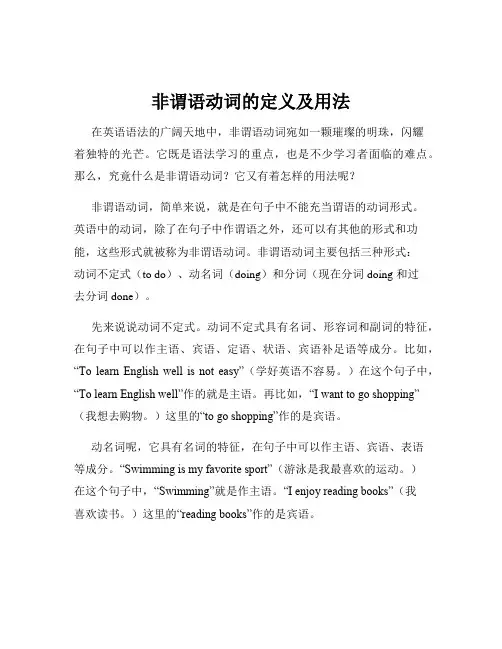
非谓语动词的定义及用法在英语语法的广阔天地中,非谓语动词宛如一颗璀璨的明珠,闪耀着独特的光芒。
它既是语法学习的重点,也是不少学习者面临的难点。
那么,究竟什么是非谓语动词?它又有着怎样的用法呢?非谓语动词,简单来说,就是在句子中不能充当谓语的动词形式。
英语中的动词,除了在句子中作谓语之外,还可以有其他的形式和功能,这些形式就被称为非谓语动词。
非谓语动词主要包括三种形式:动词不定式(to do)、动名词(doing)和分词(现在分词 doing 和过去分词 done)。
先来说说动词不定式。
动词不定式具有名词、形容词和副词的特征,在句子中可以作主语、宾语、定语、状语、宾语补足语等成分。
比如,“To learn English well is not easy”(学好英语不容易。
)在这个句子中,“To learn English well”作的就是主语。
再比如,“I want to go shopping”(我想去购物。
)这里的“to go shopping”作的是宾语。
动名词呢,它具有名词的特征,在句子中可以作主语、宾语、表语等成分。
“Swimming is my favorite sport”(游泳是我最喜欢的运动。
)在这个句子中,“Swimming”就是作主语。
“I enjoy reading books”(我喜欢读书。
)这里的“reading books”作的是宾语。
接下来是分词。
现在分词具有形容词和副词的特征,过去分词也具有形容词和副词的特征,但它们的意义和用法有所不同。
现在分词通常表示主动和进行的意义,过去分词通常表示被动和完成的意义。
现在分词在句子中可以作定语、状语、宾语补足语等成分。
例如,“The smiling girl is my sister”(那个微笑的女孩是我妹妹。
)“Smiling”作定语,修饰“girl”。
“He sat there, reading a book”(他坐在那里,读着一本书。
第四讲非限定性动词(非谓语)非限定性动词(非谓语)的基本概念非限定性动词是动词的非谓语形式,在句中不可单独用作谓语,不受主语的人称和数的限制,但是可用作其他句子成分。
有以下三种形式:To do --------infinitive 不定式V. +ing -------gerund 动名词Participle ------- -ing participle现在分词-ed participle 过去分词Infinitives 动词不定式1.作主语To finish the work on time is not easy.=It’s not easy to finish the work on time. (it形式主语,动词不定式真实主语)It is hard for us to learn German.It is really kind of you to say so.在表示人物性格,特征等形容词的后面常用of: kind, nice, wise, clever, careful, careless, right, wrong, considerate, thoughtful, foolish, silly, stupid, good, polite, grateful, brave, rude, honest, bold, absurd, courageous, cruel, wicked, ... etc.2.作表语His wish is to become a teacher.The purpose of the project is to improve students’ reading ability.说明或解释主语的内容,也可表示将来的动作主语常用:wish, purpose, aim, difficulty, function, plan, principle, problem, rule, task*作表语时,主语部分有doAll you need do now is (to) put the books in order.The only thing you can do is (to) tell the truth.3.作宾语I want to see the new film.I promise to do it myself. =I promise that I will do it myself.They found it impossible to get everything ready in time. (it 形式宾语,动词不定式真实宾语)*只用to do,不用-ing做宾语的动词agree, afford, arrange, ask, attempt, bother, choose, claim, consent, decide, demand, determine, expect, fail, guarantee, happen, hesitate, hope, learn, long, manage, offer, plan, prepare, pretend, promise, prove, refuse, seek, tend, threaten, trouble, undertake, volunteer, want, wish4.作宾语补足语(1) The rules require all the passengers to show their tickets.I can always count on him to help at any time.*常用于v. sb. to do sth. 的动词advise, allow, ask, beg, command, encourage, entitle, expect, forbid, force, instruct, intend, invite, oblige, prefer, remind, tempt, urge, order, permit, require, request, want, teach, wish, persuade, ... call on, count on, rely on, depend on, long for, wait for, ... etc.(2)He asked me to open the door.动词不定式在作have, make, let, see, hear, feel, look at, notice, watch, listen to, observe, feel等使役,感官动词的宾语补足语时,不定式不带“to”He makes his son do his homework on his own.We often hear her sing in the next room. (help可以带to, 也可以不带to)This book can help us enlarge our vocabulary.*上述动词用于被动语态的句子中,动词不定式变成主语补足语,这是必须带“to”He was heard to sing in the next room every morning.He made us read English aloud. (=We were made to read English aloud.)*I let him go. ---He was let go (by me).(3)Scientists think laser (to be) one of the most useful tools in use today.I believe him (to be) honest.在think, know, believe, consider, prove, find, feel, declare, guess, suppose, imagine等词后面,常跟“to be +名词/形容词”结构作宾语补足语,但是to be常可以省略。
高中英语非谓语动词讲解 (整理)非谓语动词是指包括不定式、动名词、现在分词和过去分词在内的一类动词形式。
它们不受主语人称和数的限制,不能充当谓语,但可以充当句子的其他成分。
此外,它们也有时态和语态的变化。
动词不定式是非谓语动词中的一种形式,它没有人称和数的变化,不能独立作谓语,但仍然保持动词的特点,可以有自己的宾语和状语。
动词不定式有一般式、完成式、进行式和完成进行式四种形式。
当不定式的逻辑主语是这个不定式所表示的动作的承受者时,不定式一般要用被动式。
不定式的一般式表示的动作或状态发生在谓语动词表示的动作或状态的同时或之后。
例如:XXX。
The building to be finished next month is for our teachers。
不定式的进行式表示动作正在进行,与谓语的动作同时发生。
例如:When I went to his home。
he XXX the world。
3.不定式的完成式:如果不定式所表示的动作或状态发生在谓语动词所表示的动作或状态之前,就要用完成式;如果是被动含义,就要用完成被动式(to have been done)。
例如:据说他已经写了一部关于长征的小说。
他据说在孩提时就被教授法语。
4.不定式的完成进行式:如果不定式的动作在谓语所表示的时间之前一直在进行或有可能继续进行,就要用完成进行式。
例如:我们很高兴一整个月都在和专家们一起工作。
二、不定式的用法:1.不定式做主语:不定式做主语一般表示具体的某次动作,而动名词doing则表示惯的、经常的动作。
例如:做这些事情是愚蠢的。
看见才能相信。
2.不定式做表语:不定式作表语常表示将来的动作或状态。
3.动词不定式作宾语:某些动词只能用动词不定式作宾语,如ask、agree、care、choose、demand、decide、expect、fail、help、hope、learn、manage、offer、plan、prepare、pretend、promise、refuse、want、wish等。
第四讲非谓语动词1. _______ is not very easy.A. Work out the problemB. To ask him to comeC. Send it to AmericaD. To be become a teacher2. It will take a long time _______ around the country.A. to travellingB. to travelC. travelD. travelling3. Mathilde had years of hard work, little food, only a cold room _______ and never had a moment to rest.A. to liveB. livingC. liveD. to live in4. He hates _______ the phone, and very often just lets it _______ .A. to answer; ringingB. answering; ringC. to answer; to ringD. answe ring; ringing5. I asked him to stop _______ noise, for I could not make out what the speaker was saying.A. to makeB. makeC. makingD. to making6. It was so noisy that I couldn't make myself _______ clearly.A. being heardB. hearingC. heardD. listen7. At the back of the house, there is a path _______ the river.A. leads toB. led toC. leading toD. has led to8. The need _______ foreign languages is becoming greater and greater.A. to learnB. learningC. to be learnedD. being learned9. The story is long. But it is worth _______ .A. listenB. listening toC. listen to itD. to listen10. It's no use _______ here worrying about it. Let's go to the teacher to give a clear explanation.A. sittingB. sitC. to sitD. sat11. It's very clever _______ him to say so.A. forB. toC. withD. of12. The master ordered _______ .A. the room to be sweptB. to sweep the roomC. sweeping the roomD. the room swept13. They found their bikes _______ .A. stolenB. to stealC. stealingD. stole14. What he said was really too good for us to _______ .A. be believedB. believing itC. believeD. believe it15. As you've never been there before, I'll have someone _______ you the way.A. to showB. showC. showingD. showed16. On her way home, she found her handbag _______ .A. being lostB. missedC. losingD. missing17. Mr Smith as well as his children and wife _______ photos on the Great Wall.A. was seen takeB. were seen takeC. was seen takingD. were seen taking18. The tools in the workshop are not allowed _______.A. taking outB. to take outC. to be taken outD. being taken out19. The books _______ during the term must be returned to the library before you leave the school forthe vacation.A. borrowingB. to brorrowC. to be borrowedD. borrowed20. "You've come just in time to help us.""Fine. What needs _______ ?"A. I doB. doneC. to be doneD. to do21. _______ as the best doctor in town, Mr. Knecht always has a lot of patients.A. To regardB. RegardedC. RegardD. Regarding22. He had a bad habit of sleeping with all the windows _______ .A. closeB. closedC. closingD. to close23. This sentence needs _______ .A. a improvementB. improveC. improvingD. improved24. I feel it's an honour _______ to attend the opening ceremony of the new company.A. to inviteB. of being invitedC. to be invitedD. having invited25. _______ early in winter?A. Do you use to get upB. Use you to get upC. Are you used to get upD. Are you used to getting up26. This boy enjoys _______ questions but dislikes _______ them.A. asking; answeringB. to ask; answeringC. asking; to answerD. to ask; to answer27. Ellen was absent this morning because she had her tooth _______ .A. fillingB. having been filledC. filledD. filled28. She was _______ and did not know what was waiting before her.A. puzzlingB. puzzledC. being puzzledD. puzzle29. I've never seen so much nice food. I don't know _______ .A. which could takeB. which one to takeC. what to takeD. to take which30. _______ dark glasses in the sun may protect your eyes.A. WearingB. WearC. Put onD. Putting on31. Most of the artists _______ to the party were from South Africa.A. invitedB. to inviteC. being invitedD. had been invited32. We must do everything possible to prevent such things from _______ again.A. happeningB. to happenC. being happenedD. happen33. _______ in thought, he almost ran into the car in front of him.A. LosingB. Having lostC. LostD. To lose34. Because of my poor English I'm afraid I can't make myself _______ .A. understandB. be understoodC. understoodD. understanding35. I happened _______ when the telephone rang.A. outB. to be outC. being outD. out of36. He hurried to the mayor's office, _______ why he needed to talk to him at such a late hour.A. wonderingB. wonderedC. wondersD. wonder37. Little Jim should love _______ to the theatre this evening.A. to be takenB. to takeC. being takenD. taking38. I would appreciate _______ back this afternoon.A. you to callB. you callC. your callingD. you're calling39. How about the two of us _______ a walk down the garden?A. to takeB. takeC. takingD. to be taking40. Paul doesn't have to be made _______ . He always works hard.A. learnB. to learnC. learntD. learning41. Mrs. Smith warned her daughter _______ after drinking.A. never to driveB. to never driveC. never drivingD. never drive42. I can hardly imagine Peter _______ across the Atlantic ocean in five days.A. sailB. to sailC. sailingD. to have sailed43. "What do you think of the book?""Oh, excellent. It's worth _______ a second time."A. to readB. to be readC. readingD. being read44. She can't help _______ the house because she's busy making a cake.A. to cleanB. cleaningC. cleanedD. being cleaned45. She looks forward every spring to _______ the flower-lined garden.A. visitB. paying a visitC. walk inD. walking in46. Tom insisted _______ to the party.A. on me to comeB. on my comingC. me to comeD. me coming47. _______ more attention, the trees could have grown better.A. GivenB. To giveC. GivingD. Having given48. Go on _______ the other exercise after you have finished this one.A. to doB. doingC. withD. to be doing49. This page needs _______ again.A. being checkedB. checkedC. to checkD. to be checked50. The first textbook _______ for teaching English as a foreign language came out in the 16th century.A. having writtenB. to be writtenC. being writtenD. written。
第四讲非谓语动词1. _______ is not very easy.A. Work out the problemB. To ask him to comeC. Send it to AmericaD. To be become a teacher2. It will take a long time _______ around the country.A. to travellingB. to travelC. travelD. travelling3. Mathilde had years of hard work, little food, only a cold room _______ and never had a moment to rest.A. to liveB. livingC. liveD. to live in4. He hates _______ the phone, and very often just lets it _______ .A. to answer; ringingB. answering; ringC. to answer; to ringD. answe ring; ringing5. I asked him to stop _______ noise, for I could not make out what the speaker was saying.A. to makeB. makeC. makingD. to making6. It was so noisy that I couldn't make myself _______ clearly.A. being heardB. hearingC. heardD. listen7. At the back of the house, there is a path _______ the river.A. leads toB. led toC. leading toD. has led to8. The need _______ foreign languages is becoming greater and greater.A. to learnB. learningC. to be learnedD. being learned9. The story is long. But it is worth _______ .A. listenB. listening toC. listen to itD. to listen10. It's no use _______ here worrying about it. Let's go to the teacher to give a clear explanation.A. sittingB. sitC. to sitD. sat11. It's very clever _______ him to say so.A. forB. toC. withD. of12. The master ordered _______ .A. the room to be sweptB. to sweep the roomC. sweeping the roomD. the room swept13. They found their bikes _______ .A. stolenB. to stealC. stealingD. stole14. What he said was really too good for us to _______ .A. be believedB. believing itC. believeD. believe it15. As you've never been there before, I'll have someone _______ you the way.A. to showB. showC. showingD. showed16. On her way home, she found her handbag _______ .A. being lostB. missedC. losingD. missing17. Mr Smith as well as his children and wife _______ photos on the Great Wall.A. was seen takeB. were seen takeC. was seen takingD. were seen taking18. The tools in the workshop are not allowed _______.A. taking outB. to take outC. to be taken outD. being taken out19. The books _______ during the term must be returned to the library before you leave the school forthe vacation.A. borrowingB. to brorrowC. to be borrowedD. borrowed20. "You've come just in time to help us.""Fine. What needs _______ ?"A. I doB. doneC. to be doneD. to do21. _______ as the best doctor in town, Mr. Knecht always has a lot of patients.A. To regardB. RegardedC. RegardD. Regarding22. He had a bad habit of sleeping with all the windows _______ .A. closeB. closedC. closingD. to close23. This sentence needs _______ .A. a improvementB. improveC. improvingD. improved24. I feel it's an honour _______ to attend the opening ceremony of the new company.A. to inviteB. of being invitedC. to be invitedD. having invited25. _______ early in winter?A. Do you use to get upB. Use you to get upC. Are you used to get upD. Are you used to getting up26. This boy enjoys _______ questions but dislikes _______ them.A. asking; answeringB. to ask; answeringC. asking; to answerD. to ask; to answer27. Ellen was absent this morning because she had her tooth _______ .A. fillingB. having been filledC. filledD. filled28. She was _______ and did not know what was waiting before her.A. puzzlingB. puzzledC. being puzzledD. puzzle29. I've never seen so much nice food. I don't know _______ .A. which could takeB. which one to takeC. what to takeD. to take which30. _______ dark glasses in the sun may protect your eyes.A. WearingB. WearC. Put onD. Putting on31. Most of the artists _______ to the party were from South Africa.A. invitedB. to inviteC. being invitedD. had been invited32. We must do everything possible to prevent such things from _______ again.A. happeningB. to happenC. being happenedD. happen33. _______ in thought, he almost ran into the car in front of him.A. LosingB. Having lostC. LostD. To lose34. Because of my poor English I'm afraid I can't make myself _______ .A. understandB. be understoodC. understoodD. understanding35. I happened _______ when the telephone rang.A. outB. to be outC. being outD. out of36. He hurried to the mayor's office, _______ why he needed to talk to him at such a late hour.A. wonderingB. wonderedC. wondersD. wonder37. Little Jim should love _______ to the theatre this evening.A. to be takenB. to takeC. being takenD. taking38. I would appreciate _______ back this afternoon.A. you to callB. you callC. your callingD. you're calling39. How about the two of us _______ a walk down the garden?A. to takeB. takeC. takingD. to be taking40. Paul doesn't have to be made _______ . He always works hard.A. learnB. to learnC. learntD. learning41. Mrs. Smith warned her daughter _______ after drinking.A. never to driveB. to never driveC. never drivingD. never drive42. I can hardly imagine Peter _______ across the Atlantic ocean in five days.A. sailB. to sailC. sailingD. to have sailed43. "What do you think of the book?""Oh, excellent. It's worth _______ a second time."A. to readB. to be readC. readingD. being read44. She can't help _______ the house because she's busy making a cake.A. to cleanB. cleaningC. cleanedD. being cleaned45. She looks forward every spring to _______ the flower-lined garden.A. visitB. paying a visitC. walk inD. walking in46. Tom insisted _______ to the party.A. on me to comeB. on my comingC. me to comeD. me coming47. _______ more attention, the trees could have grown better.A. GivenB. To giveC. GivingD. Having given48. Go on _______ the other exercise after you have finished this one.A. to doB. doingC. withD. to be doing49. This page needs _______ again.A. being checkedB. checkedC. to checkD. to be checked50. The first textbook _______ for teaching English as a foreign language came out in the 16th century.A. having writtenB. to be writtenC. being writtenD. written一、杨维岳毅然自守..以正(守自,坚守正道)尝以文见.知于郡守(表被动)适富民有犯法者......(定后,有个犯法的富人)惧无以..报德(没有办法)郡守由是益.敬重之(更加)慕.文文山之为人也,画像祀之(仰慕)居无何...,寇益急,诏天下勤王(没过多久)传檄谕.天下捐赀救国(告诉,使人知道(一般用于上对下))吾何以家为.....(我还要家干什么呢)即毁家..以为士民倡(变卖家产)累.昼夜不能寝食(连续)而史可法以大学士督师..扬州(率领军队)城破死.之(为……而死)先生曷.避诸(怎么,为什么,如“汝~弗告朕?”)避将何之.(到……去)作不髡.永诀之辞以见志(古代剃去男子头发的一种刑罚,这里就是指上文的“剃发”)凡.不食七日,气息仅存(总共)慎.毋以示世也(与“勿”、“毋”、“莫”等连用表示禁戒,相当于“务必”、“千万”等)顷之..遂卒,年五十六(不一会儿)君臣之义几何..而不绝也哉(多少,多久,用于反问)翻译下面的句子:(1)使此人当罪,以维岳故贳之,是以私爱而挠公法也。
第四讲非谓语动词1. --- I t’s raining hard ou t s i d e.Y ou’d better .-----O K.A.to go outB. going outC. not to go outD. not go ou t2. --- W h a t a bou t hiking t h i s Sunday?--- Great. I’d like w i t h y ou.A.to go ; goingB. going; goingC. going; to goD. go; to g o3. --- would mind your bike?----- N o,not at a ll.I’ll put it under the tree r i g h t a w a y.A. moveB. to moveC. movesD. m o v i n g4. During the Spring Fes t i v a l,the heavy snow s t opp e d many people from back ho m e.A. goB. goesC. w e n tD. g o i n g5. --- W h e r e’s Mr Yu , do you k no w?--- W e ll,i t’s hard to say. B u t I heard him loudly here j u s t no w.A. was readingB. readingC. had readD. to read非谓语动词概念以及考点点拨1.对于分词,不定式和动名词掌握不清。
2.常见的一些搭配没记住。
非谓语动词【考点分析】非谓语动词在句子中不能单独作谓语,但可以单独作主语、宾语、表语、宾语补足语、定语和状语。
非谓语动词是历年各地中考必考的知识点之一,主要包括动词不定式、动名词、现在分词和过去分词的基本用法、句式结构和习惯搭配等。
【趋势预测】从命题内容来看,对动词不定式作主语、定语、宾语补足语,不定式与疑问词连用,不定式与动名词作宾语的区别,过去分词作定语等是今后考查的热点;从命题形式上看,以单项填空、完型填空、词形变化为主,一般占3-8分。
一、考点明细考点一动词不定式作主语。
此时,常用i t 作形式主语,而把动词不定式放在后面,这样句子可以避免头重脚轻。
I t’s easy to get l o s t in a big c i t y like Tokyo. 在东京这样的大城市容易迷路。
I t is good to read English in the m o r n i n g.早上读英语大有好处。
考点二动词不定式作宾语。
常接动词不定式作宾语的有a ff o r d,agree, b e g i n,decide, expect, f a il,f o r g e t,happen, help, hop e, learn, plan, prepare, pretend, w a n t,start, w i s h, promise 等。
I c a n't a ff o r d to buy a d i g i t a l camera at the m o m e n t.我现在买不起数码相机。
I w a n t e d to show it to you. 我想把它给你看一看。
考点三动词不定式作表语。
不定式作表语表示主语的职业、职责或性质等,通常对系动词前面的名词进行诠释说明。
His wish is to become a doctor. 他的愿望是成为一名医生。
To h i m,the f i r s t i m po r t a n t t h i n g was to save li v es.对他来说,最重要的事情就是抢救生命。
考点四动词不定式作宾语补足语。
1 常接带t o 的不定式作宾语补足语的动词有w a n t,ask, tell, teach, w i s h,a ll o w,i n v i t e等,构成w a n t/a s k sb. to do sth. 句型表示“想要/让某人做某事”。
Our h e a d t e a c h e r w a n t s us to school on t i m e.我们的班主任要我们按时到校。
The policeman asked the children not to play in the street. 警察让这些孩子不要在街上玩耍。
2 使役动词l e t,m a k e, have 和感官动词s ee, w a t c h,notice, look at, hear, li s t e n to, f ee l等后面接不带t o 的不定式(即动词原形)作宾语补足语。
These p i c t u r es made me t h i n k of my c h il dhood.这些照片使我想起了我的童年。
I heard children t a l k in the n e x t r oo m.我听见孩子们在隔壁交谈。
3 动词h elp 后面的不定式作宾语补足语,可以带t o,也可以不带t o。
You m u s t help me to do my homework t h i s a f t e r noon.你今天下午必须帮我做作业。
He o f t e n helps his parents clean the house. 他常常帮父母打扫房屋。
考点五动词不定式放在它所修饰的名定语词或代词之后作定语。
I have some c l o t h es to w a s h.我有一些衣服要洗。
Would you like s o m e t h i n g to drink? 你想喝点什么?考点六动词不定式作状语。
1 不定式在不及物动词后作目的状语的情况最多,可位于句首或句末。
To get good results, one m u s t s t ud y hard. 要想取得好成绩,必须努力学习。
She came here to ask f o r her book. 她来是为要回她的书。
2 不定式和某些形容词连用构成“b e +形容词+不定式”结构,作原因状语。
I’m glad to see you. 很高兴见到你。
We are sorry to t r oub l e you. 很抱歉给你添麻烦了。
3 不定式作程度或结果状语时,常与e nough (表示肯定)或t o(表示否定)连用。
He is old enough to go to school. 他长大了,该上学了。
He is too young to go school. 他太小还不能上学。
考点七疑问词w h a t,w h i c h,ho w,w h e n, where 等于动词不定式连用。
此时,它在句中作主语、宾语、表语或宾语补足语。
Where to buy t h i s kind of c o m pu t e r is a p r ob l e m.到哪里去买这种计算机是一个问题。
I really don’t know w h a t to do. 我的确不知道该怎么办了。
The qu es t i on is how to get there. 问题是怎么到那里去。
Can you t e ll me which one to choose? 请告诉我选择哪一个?考点八动词不定式作宾语。
1 动词e njoy, practice, f i n i s h,m i nd,m i ss,keep, s u gg es t,i m a g i n e, consider 等后面只能接动名词作宾语。
My uncle enjoys going out f o r a walk a f t e r super. 我叔叔喜欢玩晚饭后出去散步。
Her sister p r a c t i ces speaking English everyday. 他妹妹每天练习说英语。
2 某些介词构成的短语动词如b e interested in, be proud o f, be w o r t h, be used to, f ee l li k e,g i v e up, t h i n k o f,take part in 等之后也接动名词作宾语。
We are proud of being Chinese. 我们因是中国人而感到骄傲。
We are used to living in t h i s city. 我们习惯住在这个城市里。
考点九某些动词后面接不定式或动名词作宾语的异同。
1 动词l i k e,hate, start, begin 后面可以接不定式或动名词作宾语,意思没有太大区别。
但后面接动名词指经常性的动作,接不定式指一次性的具体动作。
I like s w i mm i n g.我喜欢游泳。
I like to s w i m.我现在喜欢游泳。
2 动词s top, f o r g e t,remember, go on, try 后面接不定式或动名词意思有区别。
She s t opp e d crying and li s t e n e d to the m u s i c.她停止哭泣去听音乐。
Dr. Wang s t opp e d to the w e a t h e r report. 王医生停下来去听天气预报。
考点十分词作定语。
单个分词作定语置于被修饰的词语之前;分词短语作定语置于被修饰的词语之后。
China is a developing c oun t r y and America is a developed c oun t r y. 中国是一个发展中国家,美国是一个发达国家。
A li tt l e child learning to walk o f t e n f a il s.学走路的小孩常常摔跤。
The d i c t i on a r y borrowed from Li Ming is on the d es k. 从李明那里借来的那本字典在桌子上放着呢。
考点十一感官动词感官动词s ee, w a t c h,notice, hear 等后面接不带t o 的不定式(即动词原形)作宾语补足语时强调动作经常发生或强调动作发生的全过程;而现在分词强调动作正在进行。
I o f t e n see him play b a s k e t b a ll on the p l a yg r ound.我经常看见他在操场上打球。